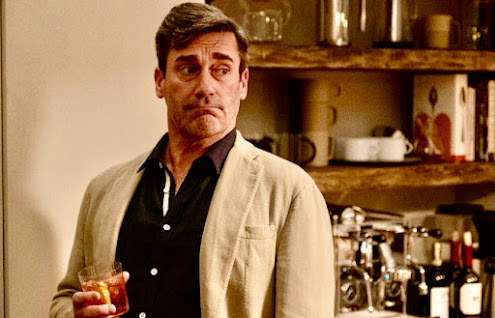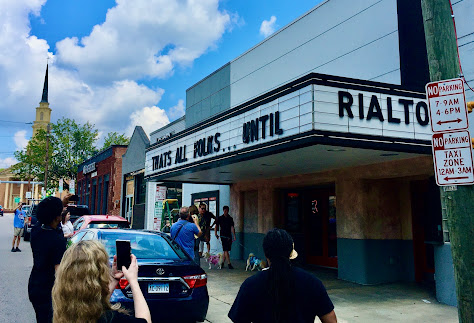CONFESS, FLETCH (Dir. Greg Mottola, 2022)
After decades in development hell, investigative journalist Irwin M. Fletcher returns to the big screen, albeit in a limited release that will largely not be noticed. For those not in the know, Fletch is a character created by Gregory Mcdonald for a series of popular comic mystery novels that kicked off in the mid ‘70s, and is best known from his incarnation as Chevy Chase in two movies in the ‘80s - one a comedy classic, FLETCH (1985); the other, FLETCH LIVES (1989) not so much.
For the last three decades, the concept of rebooting FLETCH has come and gone a bunch of times. From all accounts, it began with Kevin Smith in the late ‘90s planning a project dubbed SON OF FLETCH, which would’ve involved Chase, but that fell through when Chase was an asshole to Smith or something. Then the project later became FLETCH WON, based on the tenth book in the series, and names like Ben Affleck, Ryan Reynolds, and Jason Lee (Smith’s choice) were batted around.
That’s how it would go – every now and then, word would spread about a FLETCH reboot, some names like Zack Braff (yeah, right), John Krasinski, Justin Long, Jason Sudeikis, and even Dave Chappelle are thrown around, then the project disappears. But out of the blue last summer, a trailer appeared featuring Jon Hamm of Don Draper/Mad Men fame smarming his way through some decent one-liners in a new comic thriller, and 33 years later, Fletch lives again.
But is Fletch really such an iconic character that needed resurrecting? His detached, above-it-all master of the sarcastic arts demeanor has been done to death by dozens of comic actors in countless comedies – it was an archetype long before Fletch came around, but Chase’s straddling of the line between being a witty, yet edgy charmer, or being an sexist, inappropriate asshole has branded the role. I’m not saying that Fletch as a character concept is problematically out-of-date, just that his persona just isn’t that appealing or funny as Mottola’s film thinks he is.
This is despite a valiant effort by Hamm to fill Chase’s shoes. In the film’s first moments, we watch our the preppy-attired Lakers fan enter a luxury apartment in Boston to find a woman’s dead body lying on the carpet. This cold opening, involving Fletch trading forgettable banter with police detectives played by the slightly embarrassed looking actress, Ayden Mayeri, and The Daily Show’s Roy Wood Jr., sets the movie’s stylishly lackadaisical tone. When Fletch ques the film’s title card with the line “I’m an open book,” it doesn’t have any impact or sense of any excitement – it’s almost as if the film wants us to react to it with a “meh.”
From there we are taken into a plot concerning the kidnapped father of Fletch’s girlfriend Angela Di Grassi (Lorenza Izzo), with the ransom being a Picasso painting worth millions. While a suspect for murder, and switching identities more often than his underwear (not really, but that was the tagline on the original’s poster), Fletch does his unctuous, self-amused thing in talky set-pieces engaging quest stars like Kyle MacLachlan as a snooty germaphobe art dealer who has a cringy EDM dance scene, Annie Mumolo as a flighty free-spirited train-wreck of a neighbor (the film’s oddest scene tone-wise); most embarrassingly, Marcia Gay Harden as the horny cliché of an Italian Countess; but most thankfully, Hamm’s Mad Men co-star John Slattery as Fletch’s former editor for a welcome newsroom, and drink at a bar bit cameo.
The stakes with the stolen art, the murder mystery, whatever, feel so low that it’s hard to care or remember details while the movie rolls on. In Ritchie’s first FLETCH, the premise was simple, but had teeth, and the film lived from quotable quip to quip (the Onion even once satirized its reputation with “Area Insurance Salesman Celebrates 14th Year of Quoting Fletch”) but here, the lines are so-so, with maybe every fourth or fifth one being slightly chuckle-worthy, and the whole vibe, and energy doesn’t even try to gel.
I still like the idea of Hamm as Fletch, and feel that there could’ve been something more here if there was more of a spark or fresh take on the material as the 1976 novel it came from was an acclaimed award winner, and could’ve served for a weightier adaptation. I bet director, and co-writer Mottola, and first-time screenwriter Zev Borow’s script could’ve gotten there in a few drafts.
While this is a certainly a sturdier, and better crafted film than Chase’s last turn as Fletch was given, that lame film actually had more laughs. CONFESS, FLETCH is a half-assed reboot that probably would’ve been better as a Hulu series or on some such platform as Fletch just doesn’t feel like it could or should be a cinematic deal these days. This type of snarky storytelling with its lazy plotting, light twists, and jaded jokery is the stuff of television anyway.
And that’s where you can find Hamm’s first foray as FLETCH - on a bunch of streaming services (Apple TV, Amazon, Google Play, etc.) now for $19.99, then next month on Showtime (premieres on Oct. 28, 2022) for whatever that service costs.
I’d suggest putting it on the Underhill’s bill.
More later...









